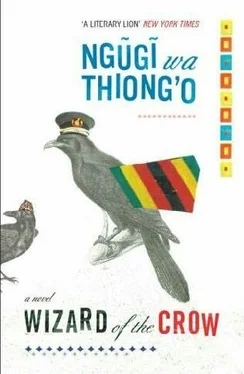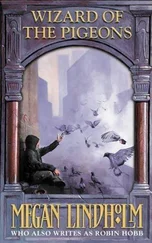Two unfortunate beggars found themselves being chased by three police officers. Covered in rags from head to toe, both carried bags clutched tightly, which was their undoing, for the police had convinced themselves that the bags were full of Burl notes the two had been collecting all day and night; their six eyes more on the bags than on the beggars themselves. The beggars found wings.
The scent of money made the three police officers deaf to all calls to return to their ranks. One police officer shouted a promise to let them go free if they would only let loose their bags, but pointlessly Discouraged, he gave up. But like dogs on a hot trail, the other two police officers kept up the chase as if bewitched and could not say no to their feet. They did not even realize that they had now left the well-lit streets of the city for the dimly lit Santalucia.
Santalucia was a sprawling village of tiny houses of every shape and material. Tiled roofs with walls of well-cut stone shared narrow streets with tin roofs and walls of red clay and cardboard. The sewage pipes were always clogged and there was a permanent stench in the air that was particularly nauseating on a hot day. But when the moon shone, as it did tonight, the village looked peaceful and quite attractive.
The beggar in the lead seemed to know his way around the narrow streets. The other followed closely. As for the police officers, they hoped that sooner or later the beggars would tire, enter a house, or come to a cul-de-sac. But the beggars did not oblige; they ran right through the village to the outskirts of Santalucia, the vast prairie surrounding all of Eldares.
One of the police officers was so deflated by this turn of events that he started reasoning with his crony to give up the chase. It was stupid to continue; what if they were being led to an armed den of thieves? Why risk their lives for money? But his fellow officer would have none of it, so he, too, decided to go back.
The remaining police officer seemed possessed because by now he had forgotten why he was running even as he increased his pace in a pointless pursuit of shadows of rags in the prairie.
They came to a bush and, though it was darker inside, the leading beggar, followed by the second, dashed in. The police officer did not hesitate and ran after them, only to fall down, trapped by something hard, like a stone. Soon he was up and running again through the bush, now guided only by the sound of the beggar’s footsteps. Emerging from the bush he saw the outskirts of Santalucia. Were they running him in circles? Between the bush and the outskirts was an open space. The police officer could see only one beggar crossing it and reentering Santalucia. Where has the other one gone? he wondered, as the beggar he had in sight disappeared behind some houses.
The police officer ran to the corner of the street. He looked to his right and left and back, but he could not see a shadow or hear any sound. He had no way of telling where the beggar had gone. The streets of Santalucia are narrow and badly lit, and although there was moonlight, to the police officer, a stranger, the streets and the houses all looked alike. Not knowing whether he was looking for one or two beggars, the police officer wondered what to do, and for the first time since the chase began he was indecisive, but only for a moment, because a more insistent inner voice was urging him not to quit. He continued with the hunt. He would force whichever beggar he caught first to lead him to wherever the other was hiding.
By now the two beggars were ensconced in a house, crouched near a window, straining to hear the slightest sound outside. They heard the police officer’s footsteps clearly but could not see him and were uncertain as to where he was.
One beggar peered through another window, and, yes, he could now see the police officer and what he was doing: his gun drawn, the policeman was going from door to door, interrogating residents. The officer stopped in front of a house where what looked like a bundle was hanging. He hesitated and moved on, and an idea came to this beggar.
“Have you got a piece of paper?” he whispered to his fellow beggar. These were the first words they had exchanged since their flight from Paradise. The beggar addressed said nothing but looked through his bag and took out a piece of paper. “No, not so small, bigger. And see if there are any bones, dry cobs of corn, rags, and a piece of string in there.”
If he was surprised by the request he did not show it; he simply groped in the dark and came back and produced a cardboard, a bone, some rags, and a string, silently handing them over and continuing his watch at the window.
The other beggar tied the bones and the rags together. He then took a felt pen from his bag and wrote on the cardboard in big letters: WARNING! THIS PROPERTY BELONGS TO A WIZARD WHOSE POWER BRINGS DOWN HAWKS AND CROWS FROM THE SKY. TOUCH THIS HOUSE AT YOUR PERIL. SGD. WIZARD OF THE CROW. With great care not to make any noise, he slowly opened the door and saw something even better, a dead lizard and a frog. He added them to the bundle of bone and rags and hung the omen just above the door before quickly retreating to join the other beggar at the window.
Crouched together, the two beggars could just about make out the area around the doorway. Soon they saw the police officer walk near, anxiously wondering what he would do. Would he break the door down? But when the officer saw the bundle of rags and bones, he took a step back. He gathered courage and approached the bundle. He was about to touch it when he saw the leg of a frog and the tail of a lizard, and he was petrified. On reading what was written on the cardboard, he found his voice and let out an anguished cry: Oh, the Wizard of the Crow! He took to his heels, muttering to himself all the while: I knew they were not thieves; they were devils, djinns of the prairie, sent by the Wizard of the Crow to trick me to death. Woe unto me! I am now bewitched. Woe unto me! I am going to die! Actually, I am a dead man walking!
The two beggars were now beside themselves with laughter. One voice sounded male and the other female, but neither beggar registered the difference. The one who seemed to know his way about the house now put on the lights. The laughter stopped. The two stared at each other, not daring to trust the evidence of their eyes. When finally they spoke, their simultaneous questions collided in the air.
“Nyawlra?”
“Kamltl?”
At Brilliant Girls High School, Nyawlra went through a period when she really struggled with her names. There was a time when she called herself Engenethi Nyawlra Charles Matthew Mügwanja Wangahü, often writing it as E.N.C.M.M. Wangahü. She was not very keen on Engenethi and became Grace Mügwanja. Grace Mügwanja stuck, mostly in the village community, and she held on to it for a while. Her father liked Grace more than Engenethi, and Roithi, her mother, liked Engenethi more than Grace, and both hated Mügwanja with equal intensity, and so to her parents she would always be either Engenethi or Grace. She herself continued struggling with these markers of identity, and after going to college she eventually settled for Nyawlra wa Wangahü, though there were some who could not bring themselves to call her anything but Grace Mügwanja.
For his part, her father liked initialing his two African names, Mügwanja and Wangahü, to form Matthew M. W. Charles, and sometimes, leaving them out altogether, he was Matthew Charles or simply Mr. Charles. He was angry with those who called him Carüthi, the African-language version of Charles, even if prefixed with a title. He would not of course have raised any objections if they had called him Sir Charles, but in their ignorance the village folk insisted on calling him Bwana Carüthi.
Читать дальше












